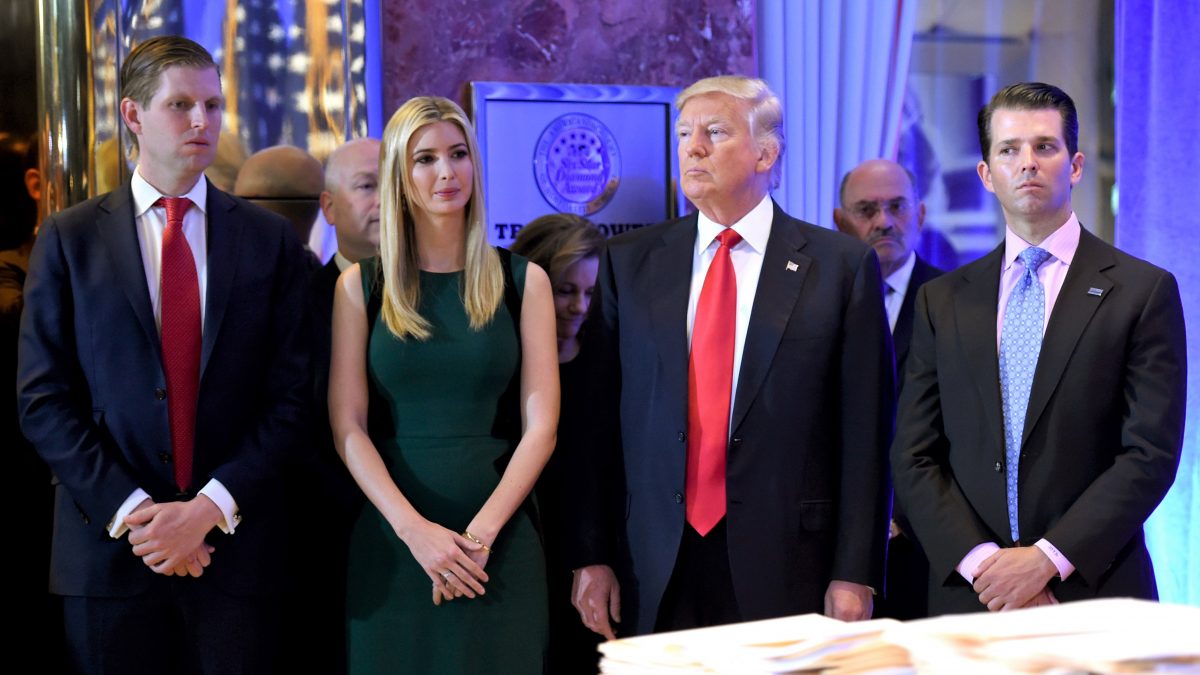
A discovery hearing in a long-running lawsuit accusing former President Donald Trump and two of his adult children of promoting a multi-level marketing scheme resulted in a series of small victories for the plaintiffs on Wednesday–even as the Trumps’ attorneys repeatedly protested the sweeping nature of those requests.
“The amended complaint uses a broad stroke,” attorney Clifford S. Robert said, arguing that the type of information the plaintiffs are trying to obtain from the Eric Trump Foundation is not line with the current and “narrow” nature of the case.
First filed anonymously in 2018, the lawsuit alleged that the Trump Corporation promoted ACN Opportunity, LLC, which does business as the American Communications Network, through various events, publications, up to and including appearances on the 45th president’s former NBC game show, The Celebrity Apprentice. Moreover, the plaintiffs alleged, ACN was actually a fraudulent “get-rich-quick scheme” that violated various state consumer protection laws and ultimately “conned” several victims out of their money.
As for the Trumps, the plaintiffs claim, they repeated and endorsed ACN’s claims without any due diligence and because they were being bribed into doing so to the tune of millions of dollars. The original version of the lawsuit alleged violations of federal racketeering and conspiracy laws but a court tossed those claims in 2019.
U.S. District Judge Lorna Schofield allowed the plaintiffs to move forward with state-based fraud, unfair competition and deceptive trade practices claims, however, due to the Trumps allegedly failing to disclose their alleged financial relationships with ACN.
That leaves the plaintiffs looking to follow a time honored tradition: the money.
U.S. Magistrate Judge Sarah L. Cave oversaw Wednesday’s hearing.
Attorney John Quinn began by making the case for his clients to obtain certain documents he said were currently being held, and not turned over, by the Eric Trump Foundation.
“The charitable donations piece has a couple of facets to it,” he said, by noting in a series of examples, that ACN hosted a charity event at a Trump golf club, that ACN and “people affiliated with ACN” were making donations to the Eric Trump Foundation.
Some of those funds, the attorney alleged, were then in turn paid back to Trump-affiliated entities.
The attorney went on to allege that “very significant” payments, including one $100,000 check, in one instance, were made from ACN to the Eric Trump Foundation and from the Eric Trump foundation to various LLCs owned by the various Trump defendants.
“ACN was compensating defendants for this relationship,” Quinn continued. “Defendants were appearing side by side with ACN executives at charitable events hosted by ACN and at charitable events hosted by the defendants.”
Cave was audibly a bit stirred by the allegations–suggesting that if the plaintiffs could prove those allegations, she was unclear as to what else, exactly, the plaintiffs needed from the defendants at this point.
“You have a lot already,” the magistrate judge said.
“The primary thing we’re really looking for here is completeness,” Quinn replied.
“That seems very broad,” Cave went on. “Money is fungible.”
The judge questioned whether information showing money flowing from ACN to the Trump entities could really support an “inference” of fraud unless it all occurred within a tight time frame. Quinn ultimately agreed that there should be a firm and limited time window for such cash flow documentation.
Robert, for the Trump defendants, said this request was akin to a fishing expedition aimed at reviving the older version of the lawsuit.
“To make the Eric Trump Foundation go beyond what has been provided and beyond what they can get in the deposition would not lead to anything relevant and would reinstate the RICO-type claims that have already been dismissed,” he said.
Cave was mindful of the defendants’ position and asked if producing “a spreadsheet or list” detailing certain donations from ACN or their founders to Trump entities would prove too burdensome.
“I don’t think that’s particularly burdensome,” she said.
Robert replied that it would actually be quite burdensome because it stands the risk of “making this case more than it is.” The Trump attorney reiterated that the plaintiffs can still try to get that information from a deposition.
READ RELATED: Jennifer Lopez shares emotional tribute for her Shades Of Blue co-star Ray Liotta
“There is a causative link missing in the plaintiff’s theory,” Robert continued, going on to say that the Trump family, and some Trump entities “shared common charitable interests” with ACN.
Cave mused that the bulk of these inquiries should, in fact, occur during Eric Trump’s deposition but settled on her original half measure as the solution–saying that it would be easier for the plaintiffs’ attorneys to reference to a document and then ask about him about it. She concluded by reiterating that a list or spreadsheet shouldn’t be too hard for the foundation’s attorneys to manage.
The two sides also disputed access to payments made in the course of the Trump children’s appearances on The Apprentice.
“So what?” the judge asked if, for example, a Trump entity paid one of the Trump children $10 million per year. “What does that tell us about the fraud?”
Quinn replied that there might have been ACN-related events that resulted in bigger cash payouts under the guise of performance-based compensation.
“We’re trying to understand the architecture,” the plaintiffs’ attorney continued. “Understanding how, if at all, that payment benefits the individual defendants, is what we’re trying to understand here.”
The judge, for her part, again suggested this information was more likely to be obtained during the deposition process. She added that she was “struggling” to “wade into the general ledger and accounting records.”
Robert again blasted the request as far too much to ask.
“This is going so far afield from the claims that are remaining in the case,” the Trump attorney said. “There is no way that can lead to anything that can be relevant to this case. That would be incredibly intrusive.”
In the end, the judge suggested that ACN payments made for The Apprentice appearances would be limited to one Trump production company. She further instructed the plaintiffs to discuss the issue with the defendants–but only after providing them with a list of The Apprentice episodes they thought were relevant to the case.
Additionally, the plaintiffs have made a broad request for certain deposition transcripts from any prior cases involving fraud allegations against the Trump family and associated LLCs.
That request from the plaintiffs was a bit too much for the court to stomach, agreeing with Trump’s attorneys.
“This is an incredibly broad and intrusive request,” Robert said, arguing that the extant state fraud claims wouldn’t be impacted by whatever they could get from such documents and would likely only be used to press previously “prohibited claims.”
“They’re just trying to make something out of nothing here,” the Trump attorney continued.
That request was cabined but granted in part, with the judge asking — and Robert agreeing — that they would limit their search to depositions involving the current deponents strictly in former cases involving state fraud or pyramid scheme allegations.
The hearing concluded with the judge issuing a tentative limit on the number of depositions that will be allowed going forward. Trump attorneys wanted that number held to the the low double digits while the plaintiffs attorneys insisted on much more.
“I’ve never seen a complex commercial case involving fraud in the SDNY where the parties were limited to 10 depositions,” said Roberta Kaplan, an attorney who also represents the plaintiffs.
Cave said she was “inclined” to grant somewhere more than 10 but less than 25 depositions–with 15 being reasonable depending on how long each deposition takes. The judge again instructed the parties to meet and confer on this point so they could agree about timeframes, with the aim of 105 hours total as a “rough goal” on the plaintiffs’ side.
In one obvious loss for the plaintiffs, the judge denied without prejudice their request to depose ACN’s four founders. Quinn countered that there is one ACN founder they’d like to talk to in particular and flagged that issue for the court, saying they would likely renew their request at a later time.
The next conference in the case is currently slated for June 8, 2022 at 12:00 p.m. by phone.
[image via TIMOTHY A. CLARY/AFP/Getty Images]
Have a tip we should know? [email protected]
Source:




